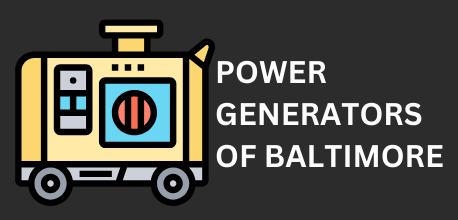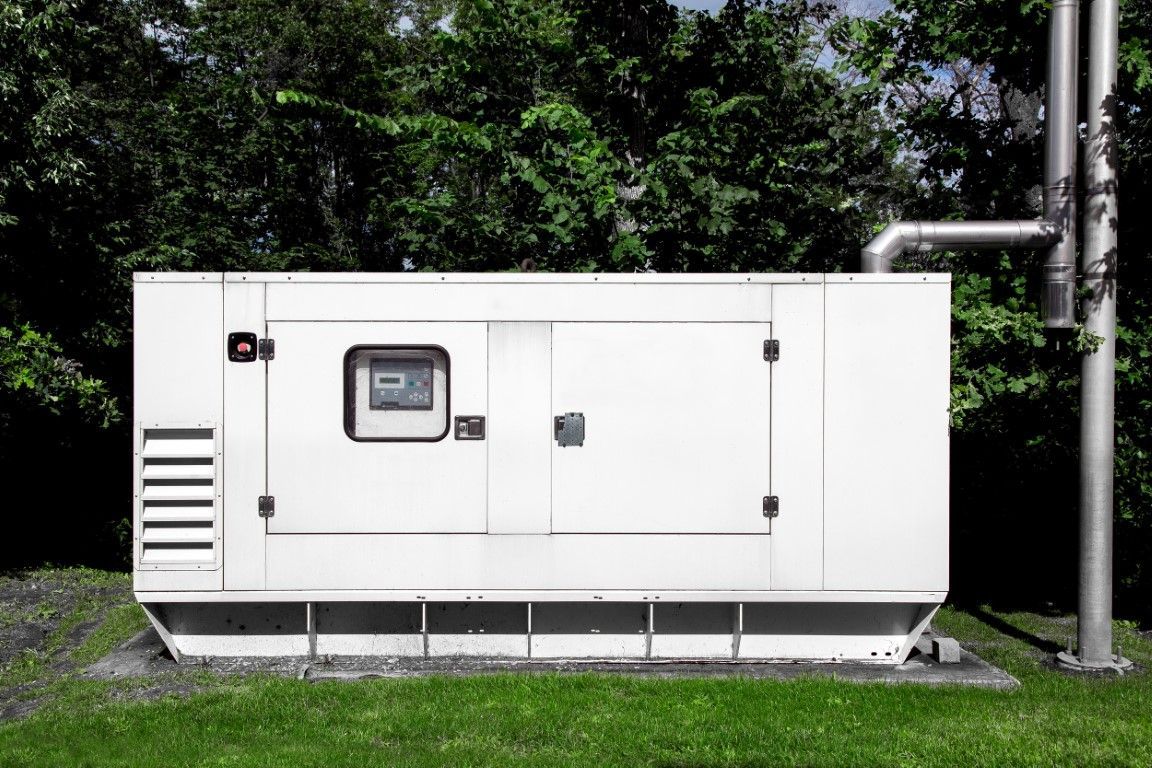
When it comes to ensuring that your home or business in Baltimore, MD stays powered during outages or emergencies, electric generators are invaluable. Understanding how they work, the types available, and how to maintain them is crucial for effective use. Electric generators are machines that convert mechanical energy into electrical energy. They provide power when the main electricity supply fails, making them essential for both homes and businesses. Generators work by using a fuel source, such as gasoline, diesel, or natural gas, to run an engine that produces electricity. This electricity can then be used to power appliances, lights, and other electrical systems.
Different Types
There are several types of electric generators to consider, each suited for different needs:
- Portable Generators: These are versatile and can be moved easily. They are ideal for short-term use and can power essential items like refrigerators and lights.
- Standby Generators: These are permanently installed and automatically kick in when the power goes out. They are connected directly to your home's electrical system and can power your entire house or specific circuits.
- Inverter Generators: Known for their efficiency and quiet operation, inverter generators are perfect for powering sensitive electronics like computers and televisions. They provide stable power with less noise.
- Whole-House Generators: These large systems are designed to power everything in your home during an outage. They run on propane or natural gas and are connected to your home's electrical system.
How It Works
Electric generators work on the principle of electromagnetic induction. The core components include an engine, an alternator, and a fuel system. The engine burns fuel to create mechanical energy, which turns a rotor within the alternator.
As the rotor spins, it generates a magnetic field that induces an electric current in the stator. This current is then sent out through the generator's electrical outlets.
Regular Maintenance
To ensure your generator runs smoothly and reliably, regular maintenance is essential. This includes:
- Checking and changing the oil: Like any engine, generators require regular oil changes to keep running efficiently.
- Inspecting the air filter: A clean air filter helps the engine run smoothly and prevents damage.
- Testing the battery: Generators often use batteries to start the engine. Ensure the battery is in good condition and replace it if needed.
- Cleaning the generator: Keep the exterior clean and free of debris to avoid overheating.

We will get back to you as soon as possible.
Please try again later.
Safety Precautions
Safety is paramount when using electric generators. Follow these precautions to prevent accidents and ensure safe operation:
- Never run a generator indoors: Generators produce carbon monoxide, a dangerous gas that can be deadly if inhaled. Always use generators outdoors in a well-ventilated area.
- Keep fuel away from the generator: Store fuel in a safe, approved container and away from any heat sources.
- Use proper extension cords: Ensure that extension cords are rated for the wattage of the generator to avoid overheating and potential fire hazards.
- Turn off the generator before refueling: Allow the generator to cool down before adding more fuel to prevent fires.
Environmental Impact and Alternatives
While electric generators are crucial for power backup, they do have environmental impacts. They emit pollutants and greenhouse gases, which can contribute to air pollution. Alternatives include:
- Solar Power Systems: Solar panels can provide a clean and renewable source of energy, reducing reliance on generators.
- Wind Turbines: In areas with sufficient wind, small wind turbines can generate electricity with minimal environmental impact.
Exploring these alternatives can help reduce your carbon footprint and contribute to a more sustainable environment.
Choosing the Right Generator
Selecting the right generator depends on several factors:
- Power Requirements: Assess the total wattage needed to run essential appliances and systems during an outage.
- Fuel Type: Consider the availability and cost of fuel types like gasoline, diesel, or natural gas.
- Noise Levels: If noise is a concern, opt for a quieter model such as an inverter generator.
- Budget: Determine your budget and choose a generator that offers the best value for your needs.
If you need assistance with selecting, installing, or maintaining an
electric generator in Baltimore, MD, we're here to help. Our team of experts can guide you through the process and ensure you have a reliable power backup solution. Contact us today to discuss your needs and get personalized recommendations. Ensure your home or business stays powered with the right electric generator.
Common Issues and Troubleshooting in Electric Generators
Electric generators are crucial for providing power during outages or in areas without access to the grid. However, like any mechanical device, they can encounter problems. Understanding common issues and how to troubleshoot them can help keep your generator running smoothly when you need it most.
Generator Won't Start
One of the most frustrating issues is when a generator refuses to start. This problem can stem from several causes:
- Fuel Issues: Ensure there's enough fuel in the tank. Sometimes, the fuel gauge can be faulty, or you might have run out without realizing it. Also, check if the fuel is old or contaminated, which can prevent starting.
- Battery Problems: Generators rely on a battery for starting. If the battery is dead or corroded, it won’t start. Test the battery and connections; if necessary, replace the battery or clean the terminals.
- Ignition System Failure: The ignition system might have issues such as a faulty spark plug. Inspect the spark plug for wear or carbon buildup and replace it if needed.
- Safety Switches: Some generators have safety switches that prevent starting if not properly engaged. Check all switches and ensure they are in the correct position.
Generator Starts but Runs Rough
If your generator starts but runs unevenly or shuts down shortly after starting, consider the following:
- Fuel Supply Problems: An inadequate fuel supply can cause rough running. Ensure the fuel lines are not clogged or kinked. Also, check the fuel filter for dirt or blockages.
- Air Filter Issues: A dirty or clogged air filter can disrupt the air-fuel mixture, causing poor performance. Clean or replace the air filter as needed.
- Carburetor Problems: If the carburetor is dirty or malfunctioning, it can cause rough running. Clean the carburetor and adjust the settings as per the manufacturer’s recommendations.
- Oil Level and Quality: Low or dirty oil can affect engine performance. Check the oil level and quality, and change it if necessary.
Generator Runs but Produces No Power
When a generator runs but doesn’t supply power, it can be due to:
- Circuit Breaker Issues: The generator’s circuit breaker may have tripped. Check the breaker panel and reset any tripped breakers.
- Loose Wiring: Loose or disconnected wiring can prevent power from being delivered. Inspect the wiring connections and tighten or reconnect them as needed.
- Faulty Voltage Regulator: The voltage regulator controls the generator's output. If it fails, it can prevent the generator from producing power. Test the voltage regulator and replace it if necessary.
- Overloaded Generator: An overload can occur if you’re trying to power more devices than the generator’s capacity. Reduce the load and check if the generator starts producing power again.
Generator Shuts Down Unexpectedly
Unexpected shutdowns can be alarming and are often caused by:
- Overheating: Generators can overheat if they’re running too long without a break or if the cooling system is malfunctioning. Ensure the generator is well-ventilated and check the cooling system for issues.
- Low Oil Pressure: Many generators have sensors that shut down the engine if oil pressure drops too low. Check the oil level and quality, and address any leaks or issues.
- Fuel Starvation: If the generator is not receiving enough fuel, it may shut down. Ensure the fuel supply is consistent and check for any blockages in the fuel lines.
Generator Makes Unusual Noises
Unusual noises can indicate a variety of problems:
- Engine Knock: Knocking noises can be caused by engine issues such as a lack of lubrication or internal damage. Check the oil level and quality and have the engine inspected by a professional if needed.
- Grinding or Rattling: Grinding or rattling sounds may indicate a problem with the generator’s internal components, such as bearings or the alternator. Inspect the generator and consult a technician if necessary.
- Backfiring: If the generator backfires, it could be due to incorrect fuel mixture or timing issues. Adjust the carburetor settings and check the ignition timing.
Generator Produces Fluctuating Voltage
Fluctuating voltage can cause damage to connected devices and indicates potential issues:
- Worn Brushes: Worn or damaged brushes in the generator can cause voltage fluctuations. Inspect and replace the brushes if needed.
- Faulty AVR (Automatic Voltage Regulator): A malfunctioning AVR can lead to unstable voltage output. Test the AVR and replace it if it’s not functioning correctly.
- Loose Connections: Loose connections in the electrical system can cause voltage issues. Check all connections and tighten them as needed.

Regular maintenance and timely troubleshooting are key to keeping your electric generator in good working condition. By understanding these common issues and knowing how to address them, you can ensure that your generator provides reliable power when you need it most. If problems persist or if you're unsure about handling repairs yourself, consulting a professional is always a good idea.
The Importance and Common Uses of Electric Generators
Electric generators are essential devices that convert mechanical energy into electrical energy. They play a crucial role in both everyday life and specialized applications. Understanding their importance and common uses can help you appreciate their value and how they fit into various scenarios.
Emergency Power Supply
One of the most vital uses of electric generators is providing backup power during emergencies. Power outages can occur due to storms, accidents, or grid failures. In such cases, a generator ensures that you have a reliable source of electricity. This can keep essential appliances running, such as refrigerators, heating systems, and medical equipment, ensuring safety and comfort.
Construction Sites
Electric generators are commonly used on construction sites where access to the power grid might be limited or non-existent. They provide the necessary electricity to power tools, lights, and machinery. This allows construction work to continue without interruption, even in remote or undeveloped areas. Generators enable contractors to work efficiently and meet deadlines.
Events and Outdoor Activities
Generators are crucial for powering events and outdoor activities. From outdoor festivals and concerts to camping trips and tailgating parties, generators supply electricity for lighting, sound systems, and other equipment. They enhance the experience by providing conveniences such as charging stations and portable heaters or fans.
Rural and Remote Locations
In rural or remote locations where extending the electrical grid is impractical or too costly, electric generators provide a practical solution. They enable homes, farms, and businesses in these areas to have access to electricity for daily activities and operations. This can include powering appliances, machinery, and communication devices.
Industrial Applications
In industrial settings, generators are used to ensure a constant power supply for production processes. They provide backup power to prevent downtime during grid failures and support operations in facilities where power reliability is critical. Generators can also be used for testing equipment and as a power source for temporary setups during plant maintenance or upgrades.
Recreational Vehicles and Boats
Electric generators are essential for recreational vehicles (RVs) and boats, where they provide power for various needs. In RVs, generators can power appliances, air conditioning, and entertainment systems, allowing for comfort and convenience while traveling. On boats, they support navigation systems, lighting, and onboard equipment, ensuring safe and enjoyable voyages.
Electric generators are versatile tools that serve a range of important functions. Whether providing backup power during emergencies, supporting construction work, powering events, or enabling operations in remote locations, their role is invaluable. Understanding these uses highlights why having a reliable generator is a wise investment for many different situations.
Let's Connect!
We offer top-notch standby whole-house generators to ensure uninterrupted power supply during outages. With our expertise and commitment to quality, you can trust us to provide reliable backup solutions tailored to your needs. Hire us today for peace of mind knowing your home or business is protected against power interruptions.